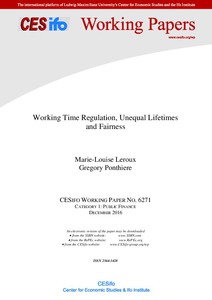Working time regulation, unequal lifetimes and fairness
"We examine the redistributive impact of working time regulations in an economy with unequal lifetimes. It is shown that uniform working time reductions, when uncompensated (i.e. constant hourly wage), can reduce inequalities in realized lifetime well-being between short-lived and long-lived pe...
| Main Authors: | , |
|---|---|
| Institution: | ETUI-European Trade Union Institute |
| Format: | TEXT |
| Language: | English |
| Published: |
Munich
2016
CESifo |
| Subjects: | |
| Online Access: | https://www.labourline.org/KENTIKA-732912455019-Working-time-regulation,-unequ.htm |
| Summary: | "We examine the redistributive impact of working time regulations in an economy with unequal lifetimes. It is shown that uniform working time reductions, when uncompensated (i.e. constant hourly wage), can reduce inequalities in realized lifetime well-being between short-lived and long-lived persons with respect to the laissez-faire, but at the cost of making the short-lived worse off. When compensated (i.e. constant labour earnings), uniform working time reductions make the short-lived better off, but at the cost of raising inequalities. Then, we characterize the ex post egalitarian optimum, where the realized lifetime well-being of the worst off is maximized, and show that this social optimum involves an increasing age profile in terms of worked hours. We examine the decentralization of that social optimum, and we provide a second-best egalitarian argument for age-dependent working time regulation, which can make the short-lived better off and reduce inequalities in realized lifetime well-being." |
|---|---|
| Physical Description: | 30 p. Digital |

